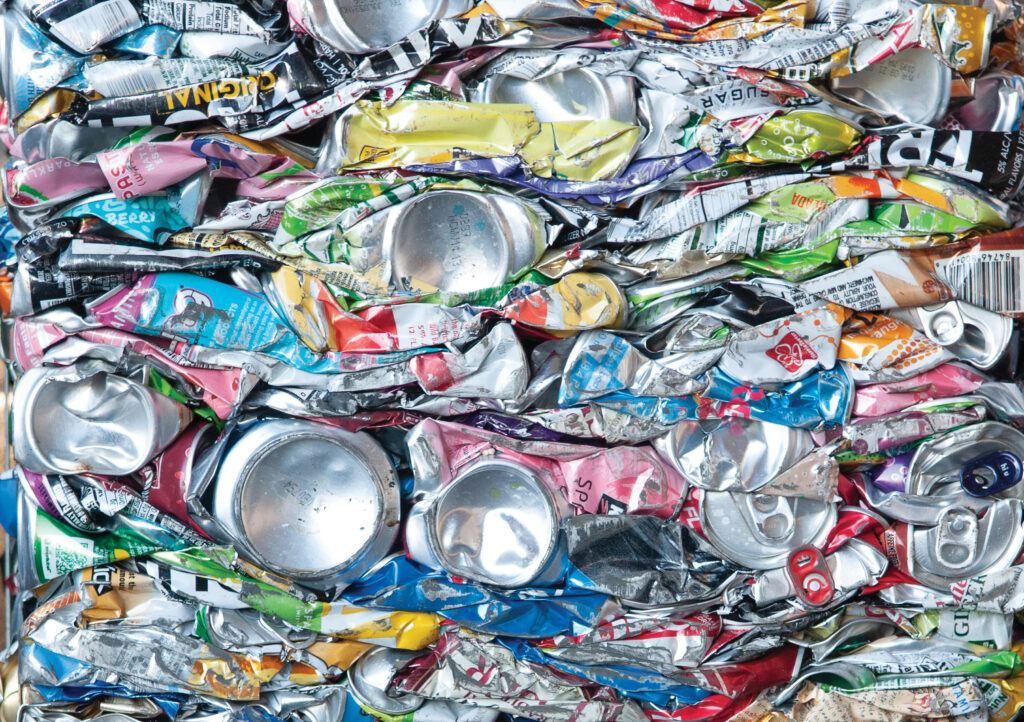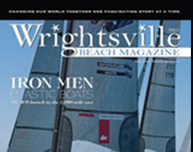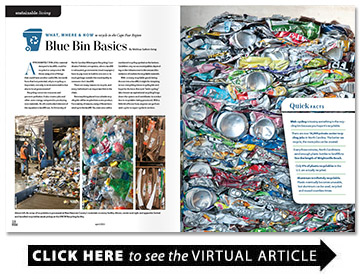Blue Bin Basics
What, where & how to recycle in the Cape Fear Region
BY Melissa Sutton-Seng

Approximately 70% of the material dumped in landfills could be recycled or composted. We throw away a lot of things that could have another useful life, but aside from that lost potential, why is recycling so important, not only to environmentalists but also to local governments?
Recycling conserves resources and prevents pollution. It also creates jobs and often saves energy compared to producing new materials. An oft-overlooked element of the equation is landfill use. As University of North Carolina Wilmington Recycling Coordinator Feletia Lee explains, when a landfill is exhausted, governments (read: taxpayers) have to pay more to build a new one or to truck garbage outside the municipality to someone else’s landfill.
There are many reasons to recycle, and every individual is an important link in the chain.
Not everything placed in a curbside recycling bin will be recycled into a new product. For a variety of reasons, many of those items wind up in the landfill. Yes, even ones with a numbered recycling symbol on the bottom. Guidelines vary across municipalities depending on the infrastructure in the area and the existence of markets for recyclable materials.
With so many recyclable goods being thrown into a landfill, it might be tempting to toss everything into a recycling bin and hope for the best. But such “wish-cycling” (also known as aspirational recycling) bogs down the system and contributes to a reduction in recyclables being processed. With a little bit of know-how, anyone can go from wish-cycler to super-cycler in no time.
Quick Facts
Wish-cycling is tossing something in the recycling bin because you hope it’s recyclable.
There are over 16,000 private sector recycling jobs in North Carolina. The better we recycle, the more jobs can be created.
Every three minutes, North Carolinians send enough plastic bottles to landfills to line the length of Wrightsville Beach.
Only 9% of plastic recyclables in the U.S. are actually recycled.
Aluminum is infinitely recyclable. Plastic eventually becomes unusable, but aluminum can be used, recycled and reused countless times.
Municipal Recycling in the Cape Fear Region
New Hanover, Brunswick, Pender and Onslow counties all have the same recycling guidelines because all materials collected are processed by Sonoco Recycling. Each county has drop-off locations if your neighborhood doesn’t have curbside pickup. Here’s what city and county governments in the Cape Fear region accept for recycling:
Plastics
Plastics are the most confusing material to recycle. Those little triangle symbols on plastic containers might indicate an item is recyclable when in reality many municipalities aren’t able to accept it. Currently, Sonoco is only processing #1 and #2 plastics. The market for lower grades of plastic collapsed following China’s 2018 decision to stop importing most recyclables for processing, so plastics numbered 3 through 7 should be left out of the bin. Instead, drop off plastic bags and other #4 plastic films at participating grocery stores, or take all plastics except #3 and #7 to UNCW’s Recycling Depot.
Paper
Nearly every paper product can be recycled, if it’s clean and dry — copy paper and cardboard boxes, paper towel rolls, magazines, (rinsed out) paper cartons for milk and other liquids, and even the non-greasy part of pizza boxes (drop the greasy sections off for composting). There’s no need to remove staples or paperclips, but boxes and cartons should be flattened. Receipt paper belongs in the trash bin; it contains plastic and chemicals that prevent it being recycled.
Glass
Glass of every color is accepted. Bottles and jars should be rinsed and recycled without their lids. Ceramics might seem similar to glass, but they aren’t recyclable.
Metals
Metal is the most valuable recyclable. That includes cans and metal containers of nearly every kind, including those for soup, drinks, pet food, and more. Just rinse them out to avoid contamination. Don’t put aerosol cans or any pressurized containers in the city or county recycling bin as they pose a safety hazard to workers operating mechanized equipment. UNCW accepts aerosols because its workers sort recyclables by hand. Metals that won’t fit in the bins or that would pose a safety hazard can be sold to a metal recycling company.
Plastic Recycling Cheat Sheet
- #1 accepted everywhere in the Cape Fear region
- #2 accepted everywhere in the Cape Fear region
- #3 not accepted locally
- #4 accepted at UNCW and most local grocery stores
- #5 accepted only at UNCW
- # 6 accepted only at UNCW
- #7 not accepted locally
How to Recycle Well
Know the code
Look up the specific guidelines for your county to know what’s currently being accepted.
Start from the shelves
Increase your household’s recycling rate by purchasing products in easily recycled packaging.
Think beyond the bin
Reduce your contribution to the landfill pile beyond what municipal recycling services are able to handle by utilizing other resources like UNCW’s Recycling Depot, metal recycling businesses, grocery store receptacles, and other retailers.
Make space
Set aside some space to collect and sort items your city or county doesn’t accept and drop them off at alternate sites.
Avoid contamination
Rinse, rinse, rinse! Excessive food or drink residue can contaminate a whole bale of recyclables, turning them into plain old trash. Washing with soap and water isn’t necessary, but try to reduce the “yuck factor” before putting items in the bin.
Want to be even more sustainable?
Check out the composting 101 article titled “Break it Down: Composting for Healthy Soil” in last month’s magazine to learn how to start a compost pile or participate in community composting.
Beyond the Blue Bin
Local government recycling programs are limited, but additional materials are recyclable if you know where to take them.
Plastic film (grocery bags and other #4 flexible plastics)
These can’t go in your bin because they clog recycling equipment, but many grocery stores have receptacles for them, as does UNCW’s Recycling Depot. Plastic film includes bubble mailers, zip-top bags, air pillows for shipping, six-pack rings, and similar items.
Batteries
New Hanover County collects batteries, including alkaline, zinc-carbon, zinc-air, lithium, sealed lead-acid, and any type of rechargeable battery, for recycling at designated bins in public libraries and at the Government Center as well as at Fort Fisher Aquarium, Cape Fear Community College and UNCW. Just look for the bright yellow “igloo” receptacles. Neither Brunswick nor Pender County accepts batteries for recycling. Onslow County accepts batteries and other household hazardous waste at semi-annual collection events.
Electronics
Computers, appliances, phones and other electronics contain some hazardous materials, so they need to be disassembled for recycling. Some local governments accept electronics for recycling, as do certain electronics retailers like Best Buy. Wilmington offers free electronics pickup to waste collection customers; just call in advance of your regular pickup day. UNCW also accepts electronics, including cords and string lights, at its Recycling Depot. The general rule for electronics recyclers is, “If it has an electrical cord or runs off batteries, we’ll take it!”
Household Hazardous Waste
Each county has collection sites for hazardous waste including paints, acids, chemicals, motor oil, cleaning products, pesticides and more. Check county websites for drop-off locations and a list of accepted materials. New Hanover County has a mobile hazardous waste collection van, the HazWagon, with regular collections at Ogden Park, Wrightsville Beach, Carolina Beach and Kure Beach. Check the county website for times and locations.
Snack Packaging
Snacks that come in #4 plastic can be recycled with grocery bags. Foods that come in composite packaging (those that are both shiny and plastic-y, for example) can’t be processed locally. Stores like Tidal Creek have special containers, such as those from TerraCycle, to collect snack packaging. TerraCycle bins can also be ordered for homes or offices.
Clothing and Other Textiles
Textile recycling technology exists, but the collection stream is separate from other recyclable materials. If the cloth is too worn or stained to be used or donated, look for bins from a textile recycler like Green Zone. There are several textile recycling bins around Wilmington and surrounding areas.
Food Waste Composting
New Hanover County residents can take unpackaged food waste to the county’s composter on U.S. Highway 421 or to the HazWagon. The finished compost is then used in New Hanover County parks and gardens.
The Future of Recycling
Individuals, institutions and nonprofits continue to invent new uses for recycled materials and new avenues for recycling, so stay informed on what’s available locally, or better yet invent something yourself!
Blue +Green = Teal with the Seahawks
Every school in the UNC system has a sustainability mandate, and UNCW takes the challenge seriously. Recycling Coordinator Feletia Lee and her team continually innovate, not just to make campus operations more eco-friendly, but also to give the greater Wilmington community access to supplemental resources.
The UNCW Recycling Depot on Lionfish Drive is tucked away on the campus, but its recycling bins are available to the general public 24/7. In addition to all the materials collected by county services, UNCW’s recycling program accepts plastic bags including zip tops, aerosol cans, electronics including string lights, polystyrene (aka Styrofoam), and #5 plastics.
By working with third-party recyclers, UNCW is able to reduce landfill use as well as generate funds to put back into the campus recycling program.
Polystyrene foam is made of a little bit of plastic and a lot of air, which is why it’s so light and a popular packaging material. That’s also the reason it’s not cost effective for most recyclers to process it. The UNCW team uses a machine called a thermal densifier to heat and compress polystyrene items such as packing peanuts, egg cartons, and foam coolers into hard blocks of solid plastic. A manufacturer buys the plastic blocks and turns them into things like picture frames and construction material.
Another manufacturer buys bales of plastic film (#4 plastic). This includes grocery bags, plastic bubble mailers, clean plastic wrap, and zip-top bags. The manufacturer turns the material into benches, trash cans, and composite “lumber” used for decking, among many other things.
The most common wish-cycled items are probably polypropylene (#5) plastics — things like yogurt cups, plastic cutlery, takeout containers, and bottle lids. These items look and feel like #1 and #2 plastics, so most people assume they can go right in the bin for curbside pickup. Unfortunately, Sonoco, the company most local municipalities contract with, doesn’t process #5 plastics
As of 2021, UNCW Recycling is collecting #5 plastics, which a regional manufacturer will recycle into raw material to be used in a variety of goods like reusable water bottles, food containers, and toys. Polypropylene can even be made into thread for clothing.
UNCW hand-sorts all recyclables that come through the Recycling Depot so the team can collect a wider variety of items, diverting 458 tons of recyclables from landfills in the 2019-2020 school year.
The UNCW Recycling Depot is open to the public 24/7.
This chart is for UNCW Recycling location only.
Metals
- Aluminum
- Tin/Steel
- Aerosol Cans
Glass
- Bottles
- Jars
Plastics
Accepted
- Bottles
- Beverage Jugs
- Tubs (Remove cling film from tubs.)
- Egg Cartons
- Berry Boxes
- Meat Trays
- Liquid Soap Bottles (Remove pump from soap bottles.)
Hard/Rigid Plastic
Accepted
- 5 Gallon Buckets
- Toys
- Storage Totes
- Playsets
- Laundry Baskets
- Beach Toys
- Planters
- Tupperware
Plastic Film
Plastic film should be clean and bagged together, ideally in an accepted plastic film.
Accepted
- Grocery Bags
- Zip-top Bags
- Garbage Bags
- Bubble Wrap
- Air Pillows
- Shipping Envelopes
- Produce Bags
- Dry Cleaning Bags
- Product Wrap
- Six-pack Rings
While you should keep #5 plastics out of your city or county collection bins, the team at UNCW will be happy to see them!
Plastics Not Accepted
- Straws
- Chip Bags
- Snack Wrappers
- Candy Wrappers
- Compostable Cups
- Plastic Cutlery
- Frozen Food Bags
- Compostable Food Containers
- Personal Hygiene Products
- Rubber Gloves
- Compostable Bags
- Salad Bags
Paper
No paper clips or binder clips.
Accepted
- Copy Paper
- File Folders
- Envelopes
- Paperboard
- Egg Cartons
- Paper Rolls
- Books
- Notebook Paper
- Notebooks
- Magazines
- Newspaper
- Greeting Cards
- Paper Bags
- Catalogues
- Post-Its (Remove from other paper.)
- Shredded Paper (Bag your shred separately.)
Not accepted
- Paper Towels
- Tissues/Kleenex
- Paper Plates
- Coffee Cups
- Chip Bags
- Compostable Food Boxes
- Paper Cups
- Sticker Paper
- Candy Wrappers
- Snack Wrappers
- Paper Bubble Mailers
Cardboard
Cardboard should be flattened.
Accepted
- Corrugated Cardboard
- Cardboard Boxes
- Pizza Boxes (food and grease-free)
- Shoeboxes
- Tubes
- Bulk Food Boxes
Not accepted
Contaminated Cardboard:
- wet
- food-covered
- grease-soaked
- waxed
Styrofoam (EPS)
Food containers should be clean and dry. Remove all stickers and tape.
Accepted
- Packing Blocks
- Coolers
- Craft Sheets
- To-Go Food Containers
- Cups
- Egg Cartons
- Meat Trays
- Peanuts
Not accepted
- Pool Noodles
- Foam Play Mats
- Sports Fingers
- Bendable Packaging (extruded)
- Construction Foam
- Molded Film Wrapped Foam
- Biodegradable Peanuts (Always bag peanuts separately.)
- Foam Film Packaging (extruded)
Unique & Unusual
Accepted
Electronics: Anything with a Cord
- Computers
- Monitors
- Lamps
- Fans
- Stereos
- Cell Phones
Batteries
- Alkaline
- Lithium
- Car Batteries
- Boat Batteries
- Rechargeable
Tanglers
- Hoses
- String Lights
- Hangers
- Extension Cords

